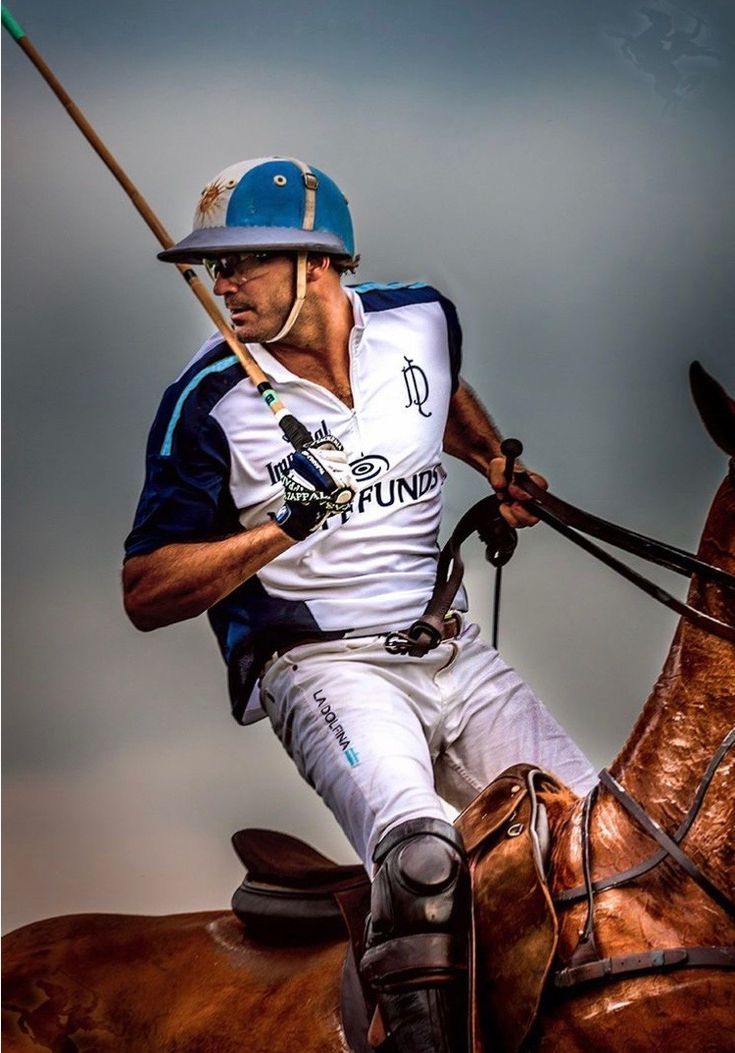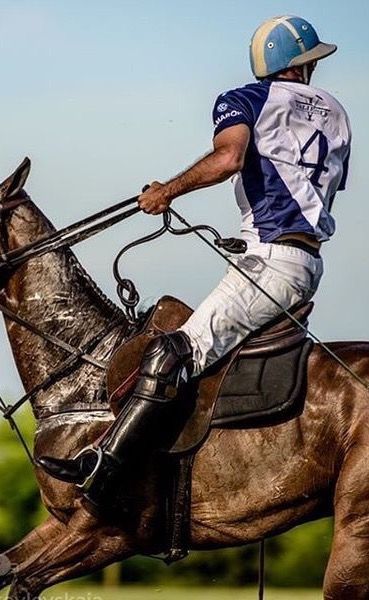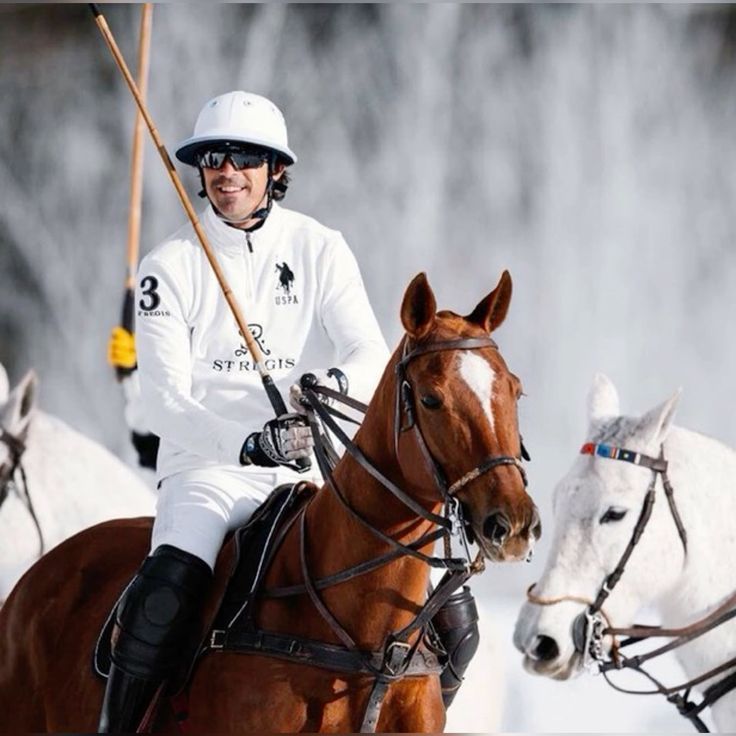POLO
Live Beautifully
A Documentary or a Bad Example of the Sport We Love?
Desperate to salvage something from their reported $100 million deal with the Sussexes, Netflix handed Harry and Meghan the reins to document the 2,500-year-old “Sport of Kings.” It took them just a few hours to tarnish it.
Across five painful, paywalled episodes, Netflix aired the long-awaited, heavily hyped docuseries on polo—executive produced by Harry and Meghan, the Duke and Duchess of Sussex. While Harry, like his brother, father, and grandfather, is a confident polo player, Meghan’s involvement felt as mismatched as swapping a polo ball for a Wiffle ball—no matter how hard you hit it, it barely moves forward.
The series was supposed to follow five players on the Wellington circuit as they chased supremacy in the U.S. Open Polo Championship.
Three choices were obvious:
- Adolfo Cambiaso, world number one and legendary 10-goaler, known by many as The GOAT
- Poroto Cambiaso, his 19-year-old son and heir apparent, also a 10-goaler
- Keko Magrini, a fearless young Argentine player eager to cement his place in the U.S. polo scene, alongside his demanding, party-life girlfriend
- Timmy Dutta, a handsome rising 20-year-old from a wealthy equestrian family, trained by his father and team owner, Tim “Big Tim” Dutta
- Louis Devaleux, a newcomer and former professional golfer who earned just over $10,000 on the minor tour between 2004–2005 and whose reputation includes more court documents than polo achievements
Breaking into the U.S. Open is no small feat. It demands years of preparation, horse management, rigorous training, team chemistry, relentless drive, and mountains of money. Over the past five years, the United States Polo Association has worked to make the sport more accessible, building fields across Wellington, Delray, and Port Mayaca, and offering affordable lessons for riders as young as ten.
Unfortunately, this side of polo was completely ignored in the series. Instead, it glamorized the players’ privileged lifestyles: expansive estates, club-sized gyms, strings of $100,000 ponies, helicopter jaunts to Miami, and vintage Broncos shuttling between barns and fields.
The drama of a father-son duel for the title would have been captivating enough. Instead, the producers shoehorned in cringeworthy, staged reality TV-style scenes between matches—a decision that fell flat.
Louis Devaleux, whose vocabulary rarely stretched beyond the F-word, quickly became the focal point of the chaos. In one scene, down by a few goals, he jumps off his horse, flings the reins at a groom, and swings his mallet into a tent pole with Aaron Judge-level force, unleashing a torrent of profanity. It wasn’t a one-off—Devaleux made these outbursts a recurring act.
During his reality-style testimonials, Devaleux seemed baffled that his competitors knew the names and nuances of every horse on the field, famously ranting, “I don’t even know the names of my own f**king horses!” No surprise there. Through fits of anger and tearful outbursts over missed shots and losses, he repeatedly insisted he’s a winner who will “never give up.” Sadly, his performance did little to back that up.
Down the road at the Dutta home, Big Tim is busy cooking what looks like a feast for his family and team members, while his dressage-trained wife and son look on. The community knows Tim Dutta as a self-made man who runs a business flying and transporting horses all over the world. He is also known as a sweet and kind man, though the edits portrayed him as an overbearing father with only one goal in mind: winning.
Timmy, his son, has been part of the Wellington polo scene since he could ride a bike. His fearless attack style on the field, combined with the quality of horses at his disposal, has propelled him into high-goal status and into the semifinals of the Open. Timmy is one to watch.
Keko Magrini represents the typical Argentine player trying to break into the U.S. market. Often, they don’t know from year to year what team will employ them. Being mounted with top-quality horses this year has given Magrini the chance to play against the best. We endure his mood swings and catfights with his on-and-off-again girlfriend—a side effect of the “Real Housewives” influence on the show—but ultimately, Magrini plays his heart out, even if it sometimes ends in defeat.
The Cambiasos could have filled five hours with highlights from just their last three games against each other. Father Adolfo is a confident, focused player who has made some of polo’s greatest moments since he was 20. His son, Poroto, shares his exceptional talent—and the striking good looks of his Argentine model mother.
There is no animosity between the players through the quarter and semifinals; they cheered for one another from the sidelines, sipping mate from the flatbeds of their pickups, field-side. Dutta gives it his all and leaves nothing on the field, while Magrini seems to get better with each game.
The final episode comes down to father and son Cambiaso going head-to-head for polo’s biggest prize, while Devaleux watches from the stands, likely through tears and disappointment.
Oh, and what about the Duke and Duchess?
Harry’s pet charity, Sentebale—which serves young people in Southern Africa—holds its annual U.S. match down the road at a rival field owned by Marc and Melissa Ganzi. In the Palm Beach charity world, where tens of millions of dollars are raised each winter for organizations like the American Cancer Society, Heart Association, Catholic Charities, AIDS Foundation, and the arts, the Sussexes seem to think they will be the draw that entices donors to shell out for South African youth. Okay.
Harry makes a very brief appearance alongside his teammate, Nacho Figueras, known both as a polo ambassador and a Ralph Lauren Polo model. Knowing Nacho’s love of the game, it’s hard to believe he was happy with the result. Figueras, who is also an executive producer of the documentary, says, “Polo is our life. We eat, sleep, and breathe polo.” While that may certainly be true for the five featured players—including the F-bomb-laden nightmares from Devaleux—it is not quite the same for Harry, who plays a few games a year just well enough to score a goal and help his team squeak out a victory to win the Cup. But with teams of cameras rolling and security all around, you have to ask yourself, “Were they playing the game for the charity or for someone else?” Enter Meghan Markle.
Coiffed, stiff, shellacked smile and determined to get some lens time, the Duchess sashays onto the field toward the winners’ platform to present her husband with the trophy, her strides briefly interrupted by her spiked heels sinking into the green turf. (Note to ladies: wedges work best at polo matches.) As she steps onto the stage, there’s an obvious “you’re in my shot” glare that Markle directs at the charity’s chairperson, Dr. Sophie Chanduaka. As Chanduaka positions herself next to Harry for the charity’s annual report photo op, Markle waves her away and motions for her to move away from her husband and out of focus. Awkward. Just months later, most of Sentebale’s board—including Harry and Dr. Chanduaka—resigned over reported mismanagement of funds. There goes the polo match.
Back to the U.S. Open: it’s Papa Cambiaso versus his son, with the younger emerging victorious. Interestingly, despite hours and hours of footage, the series repeatedly replays the same action scenes, only with different commentator audio overlays. The beauty of the horses, the skill required to ride, and the ability to execute precise strategies at full gallop were completely ignored. Worse, the series was so poorly produced and portrayed the sport as accessible only to millionaires that the reviews hurt more than a polo ball smacking you broadside.
A local member of the polo community, and someone well known to the sport, said, “I have four grandchildren and they were excited to watch the series with me, but from the first F-bomb to the next, I had to shut it off.” Others, who know nothing about the sport other than the enjoyment of watching it each week, said, “If you never ever saw a match, then I guess it was interesting, but if you know even a little about what it takes to play, ride, and raise the horses, then they did the sport a disservice... and who the hell was that guy with the potty mouth?”
The Guardian gave the series just two out of five stars, calling polo “the stupidest, most obnoxious sport known to humanity” and a “playground of the rich.” Ouch. “‘Polo’ looks destined to fall through the submenus into obscurity at the speed of light. And rightly so,” said critic Stuart Heritage. “It’s clattering and niche, and feels like a spoof documentary designed to play on screens in the background of episodes of Succession.” Oh boy.
And from across the pond, where the Royals have kept the sport somewhat visible to the commoners, The Telegraph wrote that there was “not enough of the Sussexes to make this anything other than a dull indulgence about a rich person’s pursuit.” Smack.
This was not what the polo world needed. Not at all.
The 2025 polo season in Wellington turned out to be the most attended ever. Each weekend, thousands of fans dressed up, tailgated, or watched spectacular games on satellite TV from New Year’s Day to Easter Sunday—when, coincidentally, the Cambiaso family once again competed for the U.S. Open crown. This time, Papa Cambiaso was the victor.
The author plays recreational polo in Wellington. He loves and respects the sport and everyone who makes it possible, most especially the horses.






